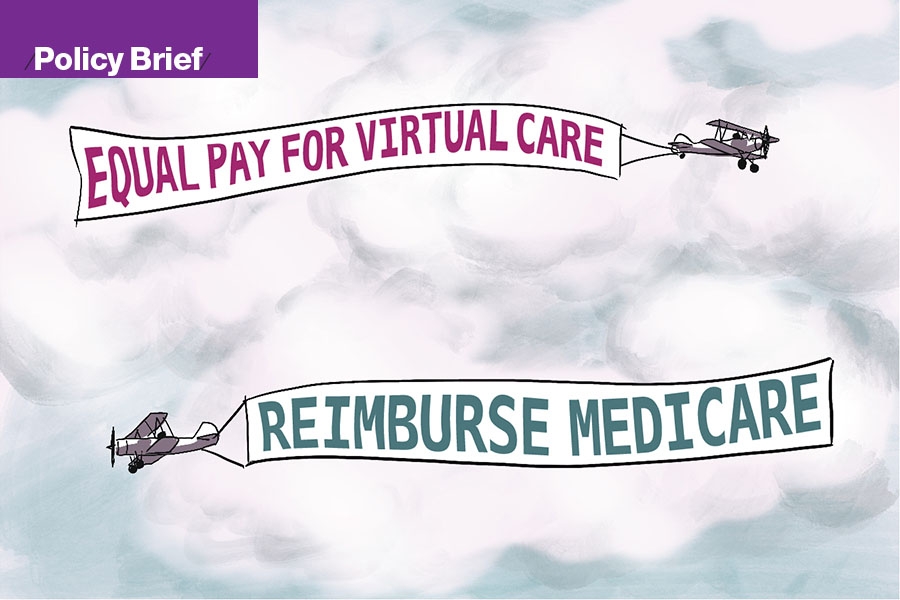Why the state should adopt comprehensive telehealth reimbursement.
Amid all the fallout from COVID-19, there is a vital opportunity that Oregon should not miss: the chance to strengthen and secure the benefits of virtual care now and for the future. Doing so will improve the health of Oregonians statewide — especially those in smaller communities and rural areas.
For thousands of Oregonians insured through large, private health systems, the value of virtual care was clear long before the pandemic.
But virtual care was rarely offered at health centers serving Medicaid populations because, often, Medicaid would not reimburse for virtual care. In March, due to COVID-19, the Oregon Health Authority made temporary changes that allowed everyone to offer virtual care and to get reimbursed for it, even through Medicaid.
Oregon should be applauded for that change, and local health centers deserve credit for rolling out virtual care so quickly in response. It leveled the playing field for thousands of Oregonians to receive the care they needed in the safest and most convenient way possible.
The state has temporarily extended emergency telehealth reimbursement through the end of this year. Now we need to permanently secure this gain and give all providers confidence that they will continue to be fully reimbursed for virtual care once the pandemic ends. We urge the state to keep this tool in fair play for everyone.
Why is this so important right now? Consider the new challenges we face: By some estimates, up to 20% of the U.S. population has lost or will lose their employer-based health insurance because of COVID-19 and the economic downturn.
That means millions of patients — including thousands of Oregonians — will turn to Medicaid for health coverage. And while it may not get many headlines, whether Medicaid can reimburse providers for virtual care will directly affect the health and well-being of Oregonians.
The medical case for virtual care — sometimes called telehealth — has long been clear, even before COVID-19. A provider sees a patient remotely, using video or telecommunications technology. It is easier for the patient, improves health outcomes and helps optimize the use of our health care resources.
At OCHIN, the national nonprofit where I work, we help primary care providers in Oregon and across the country deliver high-quality care to patients who might otherwise go without by ensuring they have access to the best tools and technology available.
Almost overnight, we saw our members transform the delivery of care through virtual appointments. In Oregon, when COVID-19 hit, primary care providers in our network quickly shifted to 50% virtual visits and were able to reach more than 100,000 Oregonians in just a matter of weeks. This was a lightning-fast transformation.
By allowing everyone access to virtual care — whether via a large private health system or a health center serving Medicaid populations — the state created equity and balance in the system.
Now, doctors and other providers are reimbursed for virtual care fairly and equally, at the same payment rate they get for in-person visits. This is critical, because care is care regardless of the mode in which it is delivered.
If we value virtual health care, we must be willing to pay for it. If we value fairness, we should maintain fairness in the system by reimbursing all providers for virtual health care services at the same level as in-person visits. And if we value innovation, we must embrace virtual care reimbursement for the long haul.
But just as Oregon’s business need regulatory certainty and predictability, health centers do too. They need certainty and predictability in Medicaid reimbursement policies. That will allow them to make needed long-term investments that support and expand virtual care — and that ultimately lead to innovation.
We urge Oregon’s leaders to seize the moment and make the Medicaid payment changes permanent. This is as an opportunity to transform health care for the better in the face of new economic realities. This is an opportunity to create resilient communities throughout Oregon. This is an opportunity to transform health care delivery for good.
Jennifer Stoll is the executive vice president of government relations and public affairs for OCHIN. OCHIN is an Oregon-based health IT organization with a 20-year history providing advanced technology, research and services to community health organizations nationally.






